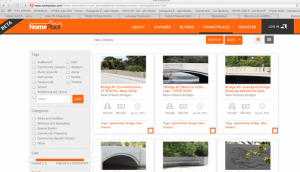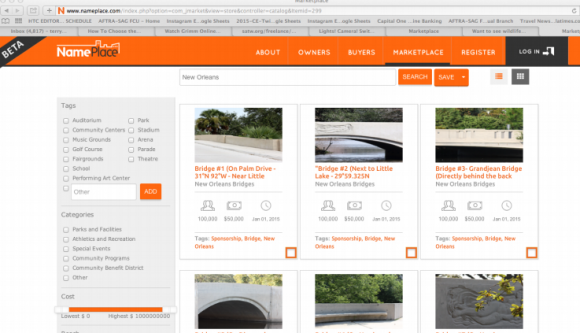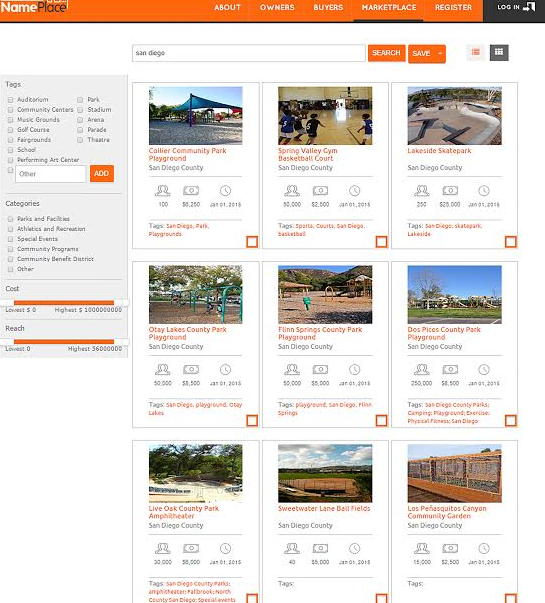aNewDomain — So it’s Valentine’s Day. If you work for or represent a city that needs more money for city services, like maintaining a park or expanding emergency services, there is a Match.com out there for you.
— So it’s Valentine’s Day. If you work for or represent a city that needs more money for city services, like maintaining a park or expanding emergency services, there is a Match.com out there for you.
I am serious. NamePlace.com is the name of a new marketplace that aims to match America’s big cities and small towns with corporate advertisers. In truth, it is more Airbnb with the spirit of the Sierra Club than Match.
There’s no need, for instance, to make anyone embarrass themselves with awful selfies or awkward videos. But the service does involve a complete reenvisioning of how cities can raise money for citizens and municipal or community services just by hooking up with an advertiser who’s willing to s ponsor, say, a theater, a ballpark or a 5K.
ponsor, say, a theater, a ballpark or a 5K.
I took a long, hard look at this intriguing new marketplace, now in beta. Here’s what I discovered about NamePlace, which is already featuring really decent advertising inventory in creative, hyperlocal venues. If you are involved in a company’s advertising or promotional efforts, here’s what you need to know about how NamePlace.com can work for you — and your favorite cities — right now.
How does NamePlace work?
There’s no question that NamePlace.com is a unique marketplace that aims to connect corporations that have money and a desire to serve with communities that need funds and volunteers.
In an interview, NamePlace cofounder and CEO Ron Brown defined the company’s mission this way:
NamePlace is the only marketplace doing this, and it distinguishes itself by focusing on “long tail” venues – not giant stadiums, but parks, soccer fields, baseball diamonds and other smaller venues, usually in neighborhoods. From a revenue standpoint, these venues lie dormant, and so for many cities, selling related sponsorships and naming rights is ‘found money.”
NamePlace is in beta, yes, but the company has been around for an eternity in startup terms: Eight months. And it’s already attracting a ton of attention for the innovative way it proposes to help communities raise serious money by letting advertisers grace local venues.
Makes sense. More than ever, cities and towns today need additional funding because they are receiving so much less money from states and federal government. Companies are always looking for new ways to exploit the hyperlocal trend in an effort to get in front of people in hometown gathering places like concert halls, theaters, sporting events and community events, like 5K races.
Everyone benefits in this relationship. What was needed was a marketplace to hook up cities with advertisers, and that is exactly what NamePlace provides.
Currently US-only but expanding eventually to other countries, the NamePlace model is quite like Airbnb’s or Uber’s. There’s no owned inventory, just a service that temporarily connects buyers with the permanent inventory of others.
A revenue model you’ll recognize
 Brown says founders set up NamePlace.com’s main revenue stream to flow from a percentage of transactions. That’s similar to the financial models that drive Airbnb and Uber. The difference is that NamePlace isn’t going to take a percentage from both sides. It will not, he said, take a percentage from the city side of the transactions. The money will come ad-side.
Brown says founders set up NamePlace.com’s main revenue stream to flow from a percentage of transactions. That’s similar to the financial models that drive Airbnb and Uber. The difference is that NamePlace isn’t going to take a percentage from both sides. It will not, he said, take a percentage from the city side of the transactions. The money will come ad-side.
To better understand how the service works, take Doral, FL or Auburn, WA. NamePlace helped set those communities up for optimal sponsorship offers. The first thing NamePlace did with these partners was to help increase overall visibility so advertisers would easily connect with them.
NamePlace, essentially, churns out ready-to-wear sponsorships so advertisers can just plug in.
At least 40 more cities are in the NamePlace.com pipeline, says Brown. He adds that his firm is also helping cities and advertisers who sign up to create profiles. That way, they can easily and quickly connect on NamePlace to form lasting, profitable partnerships.
Why does a city need a sponsor again?
The focus of the NamePlace marketplace isn’t just to get a check-writing, flush corporation to slap up its name on a Small Town, USA outfield billboard and collect the spoils.
Rather, NamePlace is out to rearchitect the relationship cities and communities have with corporations.
Corporations, after all, have meaningful amounts of money to spend, money that can enhance neighborhood communities and infrastructures hurting from an increasing lack of federal and state support. Those corporations, once set up with a community on NamePlace, would ”drive dollars into neighborhood communities and infrastructures,” Brown explained.
And it isn’t all Small Town, USA, either. Bakersfield, CA and CA’s San Diego County have inventory on NamePlace, with available opportunities ranging from local playgrounds to festivals to an amphitheatre, all places where corporations can reach locals through ads. And they’re able to do good in so doing.
 Browse through the inventory and you’ll find listings for naming rights and even volunteers to improve bridges in New Orleans. As more properties come online, NamePlace plans to help package venues so that one corporate sponsor can back not just one but a group of cities. For instance, a company could sponsor 50 baseball diamonds during the summer in the midwest. That’s a lot of bang for the buck, considering that you have a captive audience of baseball fans staring at a billboard or screen. That’s a more intense effort than just sponsoring a single field in a one-off, though both options are available.
Browse through the inventory and you’ll find listings for naming rights and even volunteers to improve bridges in New Orleans. As more properties come online, NamePlace plans to help package venues so that one corporate sponsor can back not just one but a group of cities. For instance, a company could sponsor 50 baseball diamonds during the summer in the midwest. That’s a lot of bang for the buck, considering that you have a captive audience of baseball fans staring at a billboard or screen. That’s a more intense effort than just sponsoring a single field in a one-off, though both options are available.
Lots of available city venues are already listed on the NamePlace beta site. Just for starters, you’ll find an amphitheater in Asheville, NC (home of the famed Biltmore House), a live broadcast radio show in Denver, and naming rights in Elgin, IL for the smart company who pays to sponsor its popular annual Fox Trot 5K race.
And advertising has never directly benefited cities so much.
Consider Conroe, TX. It is using NamePlace to raise money for emergency organizations by listing a collector’s car show that companies can sponsor. The funds it raises will benefit Montgomery County Emergency Assistance and Montgomery County Child Protective Services (CPS).
Suddenly ads seem a lot less self-serving when they’re used to help support the citizens of the communities who have to live with them. And, when all is said and done, that’s the genius of NamePlace.
But NamePlace also is looking for support, and that’s when things get really interesting.
Looking for angels
 As every business writer and investor knows, the best way to understand the heart of a new startup or service is to grasp the backgrounds and motivations of its founders.
As every business writer and investor knows, the best way to understand the heart of a new startup or service is to grasp the backgrounds and motivations of its founders.
NamePlace’s founders were somewhat frustrated volunteers, volunteers who felt their impact was limited as long as they were just acting as individuals.
Yet NamePlace’s place in the future will depend on its early corporate sponsors and investors. It’s past the startup phase, but it still is raising seed funding. Anyone who believes in the city-advertiser hookup model it has built would be wise to get in on the ground fall here.
NamePlace also is looking for founding sponsors to help make NamePlace a vibrant marketplace that can actually live up to the promise of helping communities fund what the services their citizens need most, just by selling some creatively well-placed ads.
NamePlace urges everyone to get the word out about NamePlace to your local city or town officials and your elected representative about NamePlace. It’s also hoping to land support from foundations like the Staples Foundation and the Bill & Melinda Gates Foundation.
To what extent that happens remains to be seen. My guess is that tech startups will grease the wheels of this startup by taking advantage of the opportunity to reach locals of the cities they target in venues they care about and feel comfortable in. It’s hyperlocal to the max. But we’ll see.
Do check out NamePlace and let me know what you think. Would you put your ads in the network? What is the service lacking and what are its strengths, in your view? Email me or drop your comment in the field below. This is a story I’ll definitely be following in the weeks and months ahead. Something definitely smells revolutionary here. Do you agree?
For aNewDomain, I’m Gina Smith.













